Items
Tag
New York
-
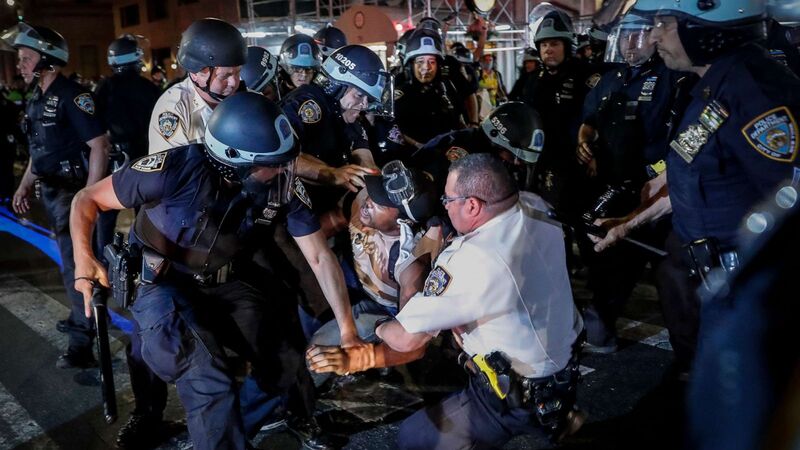 2021-05-18
2021-05-18BLM movement during COVID
The horrific and inhumane death of George Floyd was the absolute last straw for many people. His death caused such an uprising that no one was prepared for. Floyd’s death caused thousands of people across the country to protest and literally fight for their lives. Citizens began a peaceful protest which turned into violent protests which resulted in the burning and looting of the city of Minneapolis. This protest turned violent because even after the negative image the police had in the country’s eyes, they still proceeded to injure Americans, using rubber bullets and tear gas during these protests. I chose this picture because it is very impactful to me as a Black man in America it is terrifying and sad. The way police treat Black men such as myself is beyond scary and traumatizing. There are no words to describe how it feels to walk around as a man with brown skin. In the photo I selected, there are two police officers beating on a Black man while he is down on the ground. It baffles my mind how even after an individual is down, disarmed, and disables, police officers will continue to apply unnecessary force to the individual. The death of George Floyd and the events that took place after is a monumental event in history. People need to know how America, came together despite race and differences and protested to enforce the Black Lives Matter Movement. So many different groups of people put their differences aside and came together to protest the safety of Black people. It is important that police violence is captured not only for the justice of the individual who was hurt, but as a part of history. The police brutality and Black Lives Matter movement is very important part of history. This is a movement that brought together many individuals of different race, class, and beliefs to support the end the abuse of Black citizens of America. I chose this picture which occurred in Buffalo NY, officer decided to beat down a 75 year old man who was peacefully protesting. The idea of police who are supposed to serve and protect are beating an elderly man, imagine what they would do to a young man as myself. I’m glad these cruel acts of violence are now being captured and people are receiving the justice they deserve. It is also important for people to see these events as a part of history. -
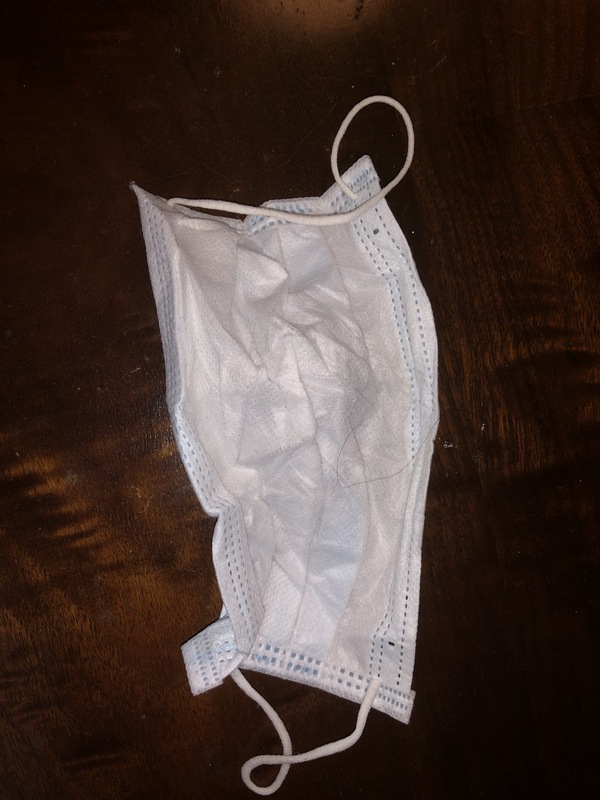 2020-02-09
2020-02-09Covid
My first mask was given to me by my dad. -
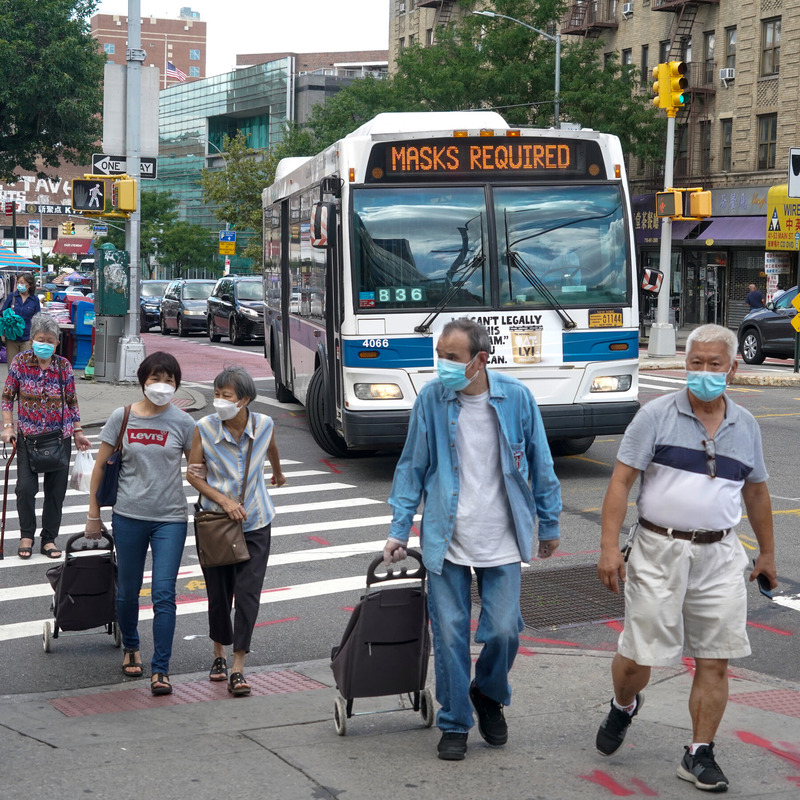 2020-08-03
2020-08-03The Pandemic that Changed It All
I think we all should take this as an experience to be prepare for the next major event. -
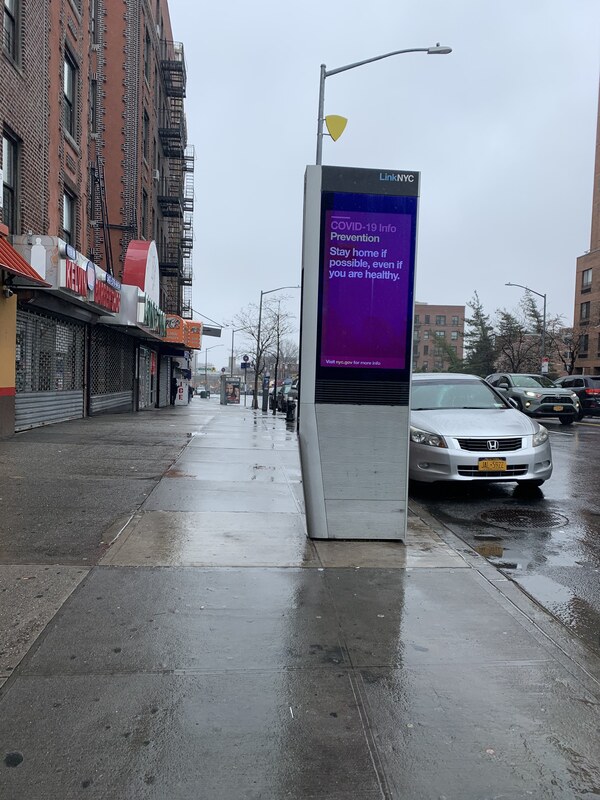 2020-03-29
2020-03-29Paranoia to Peace
I struggled with anxiety around the time the news said there was a pandemic going on, and I healed as time went on and the world around me played a part in that. -
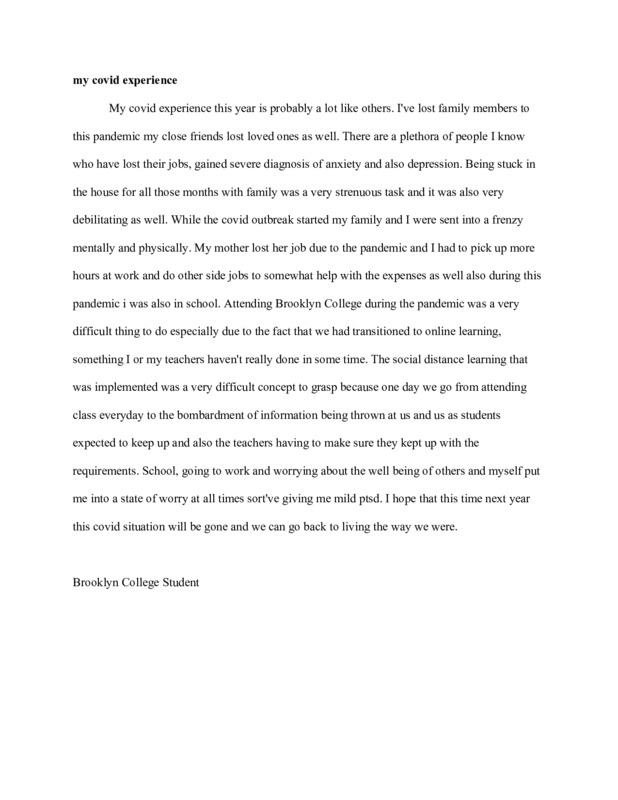 2020-03-13
2020-03-13my covid experience
My covid experience this year is probably a lot like others. I've lost family members to this pandemic my close friends lost loved ones as well. There are a plethora of people I know who have lost their jobs, gained severe diagnosis of anxiety and also depression. Being stuck in the house for all those months with family was a very strenuous task and it was also very debilitating as well. While the covid outbreak started my family and I were sent into a frenzy mentally and physically. My mother lost her job due to the pandemic and I had to pick up more hours at work and do other side jobs to somewhat help with the expenses as well also during this pandemic i was also in school. Attending Brooklyn College during the pandemic was a very difficult thing to do especially due to the fact that we had transitioned to online learning, something I or my teachers haven't really done in some time. The social distance learning that was implemented was a very difficult concept to grasp because one day we go from attending class everyday to the bombardment of information being thrown at us and us as students expected to keep up and also the teachers having to make sure they kept up with the requirements. School, going to work and worrying about the well being of others and myself put me into a state of worry at all times sort've giving me mild ptsd. I hope that this time next year this covid situation will be gone and we can go back to living the way we were. -
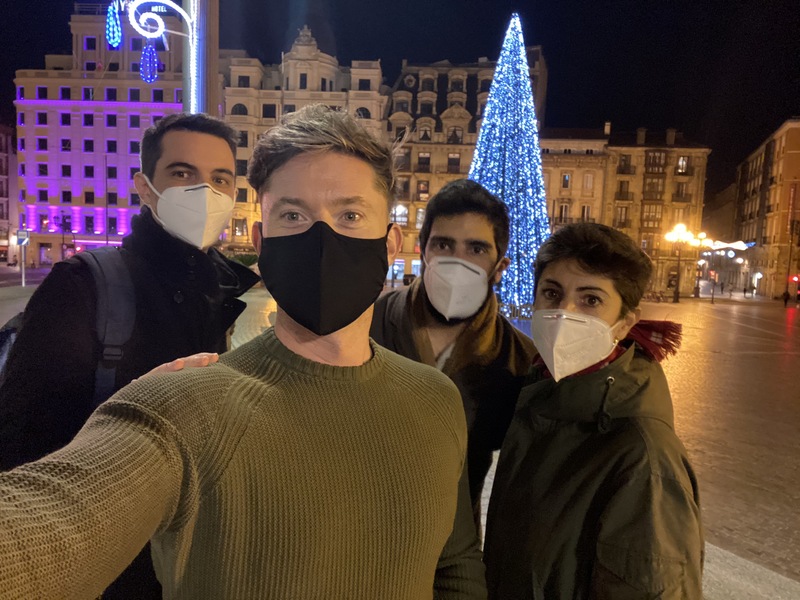 2020-11-15
2020-11-15New York, Bilbao, New York
In November 2020 I began reading Kirmen Uribe's novel Bilbao New York Bilbao while in Bilbao, Spain with my partner. We were there to care for his father who is suffering through the late stages of dementia and to spend time with his family who he had not seen in a year. Uribe's novel is important to my plague year for many reasons. He talks about the split mind being from Bilbao yet living in New York. My partner is from Bilbao, and the novel helps me understand his mindset. But Uribe also talks about the ways humans remember and carry pain and mark loss. Unlike trees who carry their growth in their rings or fish who mark time through their scales, humans mark time and pain through simply marking time. He notes that fish grow their entire lives, but humans start dying and shrinking from the moment we hit maturity. Growth, it seems is only for the fishes. My plague year was marked by my entire partner's family getting the virus, a story of gradual family loss, one of borders, and of course a presidential election. The pandemic closed not only schools and bars but also borders and our chances to move between Spain and the U.S. in any straightforward way. When we began planning the trip in the summer of 2020, we came up against all of the travel bans in place. My Spanish partner could get to Spain, but I could not. So, the research began, and I spent more time on Facebook groups than any person should be allowed to. We knew we weren't going to Spain just to have fun. We needed to take care of his father, but it felt like we were doing something wrong. Love, it turns out, knows no national borders, but border agencies certainly do. To get to Spain, he just hopped a plane to Madrid. I had to go through Lisbon, London, and Paris before arriving there. On the way back, I hopped on a plane flying directly to New York. He had to quarantine in Mexico for two weeks. Our stay there was marked by his father's continued decline but also moments of joy. The picture here captures one of those. As a U.S. citizen, his Spanish family and friends are always asking me about U.S. culture and practices. One of my tasks in Spain was to cook a big American Thanksgiving dinner, which I did with gusto. I made all the things: turkey, sweet potatoes, green bean casserole, mashed potatoes, cranberry sauce, and pecan pie. I tried to explain the significance of each dish while realizing how insignificant and somewhat gross Thanksgiving foods are. But we had fun and spent the night after the meal singing "American" songs and discussing art--his cousins are all artists. That night, one of his friends recommended I read Uribe's novel. So, I ordered it that night. It is a lonely book of loss and thinking about how art marks that loss. I think that is how we marked our time in Spain contemplating everything we had lost in 2020 and everything we were gradually losing. We spent time at the Guggenheim and Fine Arts museums in Bilbao. In fact, we waited for my partner's COVID test while browsing the Fine Arts Museum. It turned out positive, and we separated at the point for two weeks. But the picture here represents a moment of joy as we said goodnight to my partner's cousins after the Thanksgiving weekend. I hope for all the clichés of going back to normalcy. And we probably will get back to the "before times" given humans' inability to learn from any of their experiences. But I am one of those humans and just want to sit at a bar and talk to strangers again. When that normalcy returns, I will look back at this picture and remember Uribe's words: "As with the growth rings of fishes, terrible events stay on in our memory, mark our life, until they become a measure of time. Happy days go fast, on the other hand--too fast--and we forget them quickly." Maybe Uribe is wrong, though. I will not be forgetting this day anytime soon. -
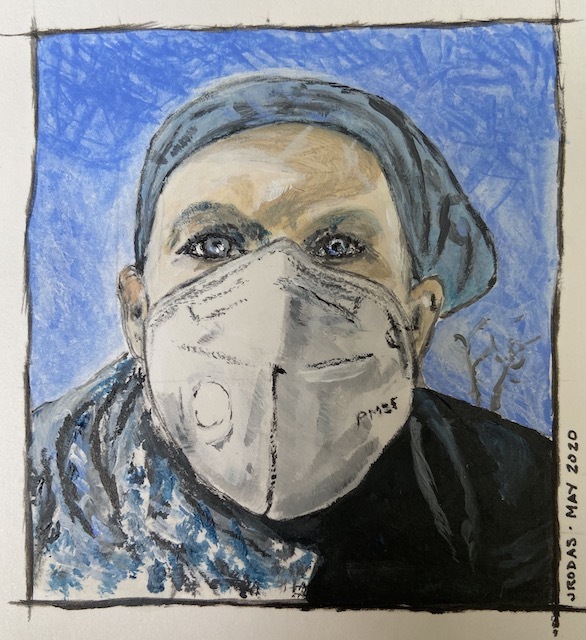 2020-05-09
2020-05-09Self-portrait with mask, May 2020
During the pandemic, I often walk in Brooklyn's historic Green-Wood Cemetery with its rolling hills, lovely views, and fantastic old monuments; it's also where my grandparents are buried. I've always loved the beautiful, timeless melancholy of the place, but during the pandemic, it was also a strange comfort to read the headstones and think of the people buried all around me. Life, sickness, crisis, death are all just part of being human. These dead humans also lived, suffered, died, and now it's just another version of the same thing. The self-portrait included here is based on a photo I took of myself in Green-Wood as I wandered there one day in April 2020, looking to get away from lockdown and to find company among the graves. -
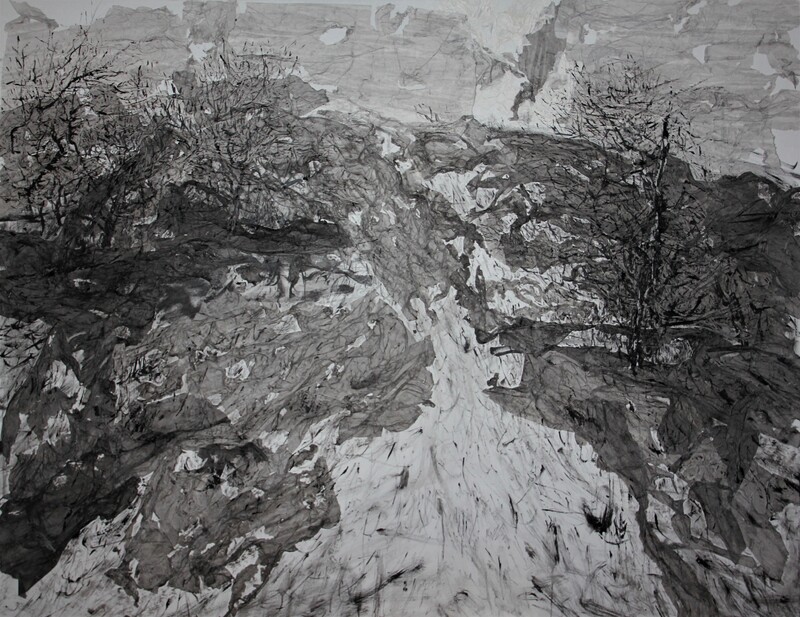 2020
2020Places of Silence
Places of Silence Artists’ Statement The cataclysmic situation caused by the Covid-19 has created a new reality for people. Society faces disastrous effects of unprecedent pandemic: losses of the human lives, loneliness, luck of personal interaction, anxiety, feeling hopeless. Visiting our favorite places, we were struck by the scarce silence of the streets, abandoned buildings, gardens. We saw the familiar places from entirely different perspective - they were silent. Spacious grounds, the ocean coast, paths in the sand were without the usual addition - a man. Our ongoing project “Places of Silence” reflects our personal experience in this new reality. Another aspect of the project is depicting the sublime beauty of landscapes surrounding us. We feel that looking at nature brings a balance and hope, as well as leads to the self-reflection, understanding oneself, and one's responsibility to other people. The project consists of ten large scale mixed media paintings on canvases and more then eighty works on paper. We have chosen paper as the integral material for the series. The origin of paper is directly related to nature. Its texture and brittleness reflect the amazing vitality and fragility of the nature. We applied black acrylic paint on the traditional oriental rice paper creating the palette of different hues and then attached small pieces of paper to the canvas the same way as if we would be using paint. Dense layers, lumps of liquid mass soaked in water, monochrome colors, an endless gradation from black to white allow us to create rich Earth like surface for our landscape works. -
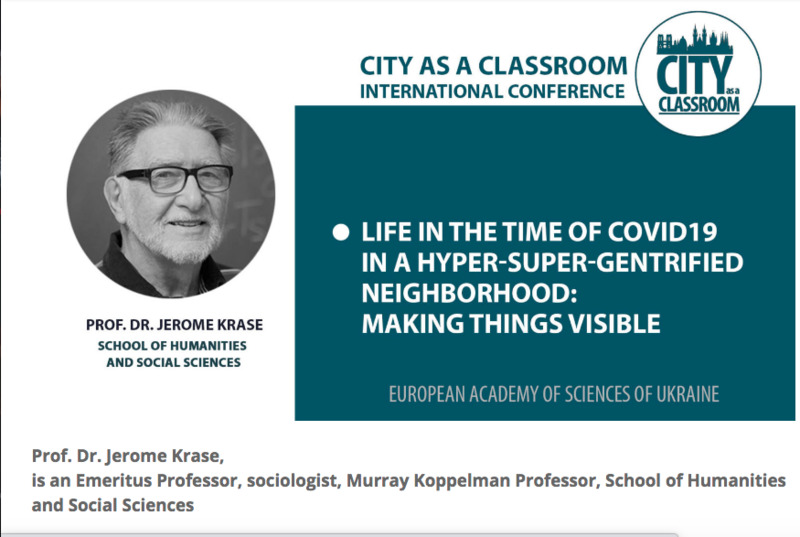 2020-03-17
2020-03-17“Life in the Time of Covid19 in a Hyper-Super-Gentrified Neighborhood: Making Things Visible”
What did my neighborhood looked like during the first phase of the New York State lockdown. How my neighbors responded to the crisis -
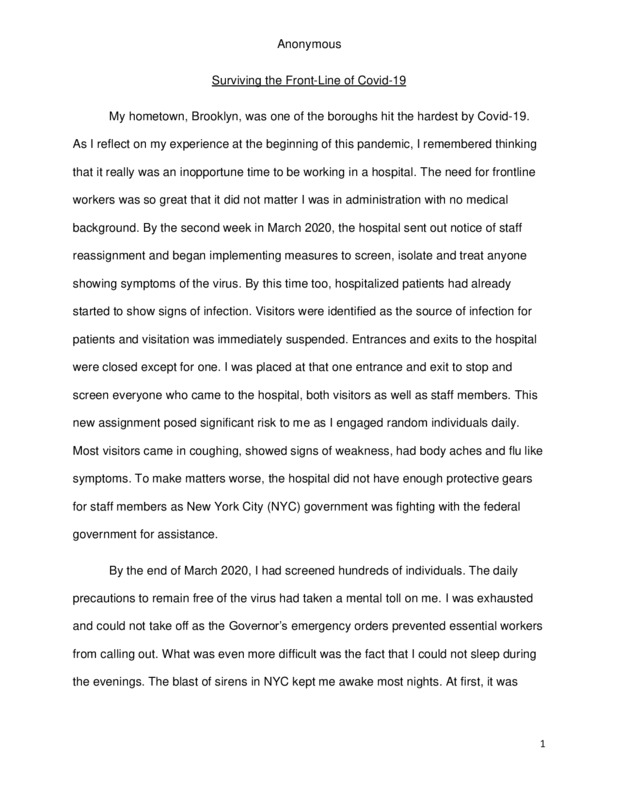 2020-04-01
2020-04-01Surviving the Front-Line of Covid-19
This story is about my experience working in a NYC hospital - being on the front-line as the pandemic hits NYC. It is important for me to tell, so that everyone is aware of how unprepared we were. Had we prepared, we could have saved lives. -
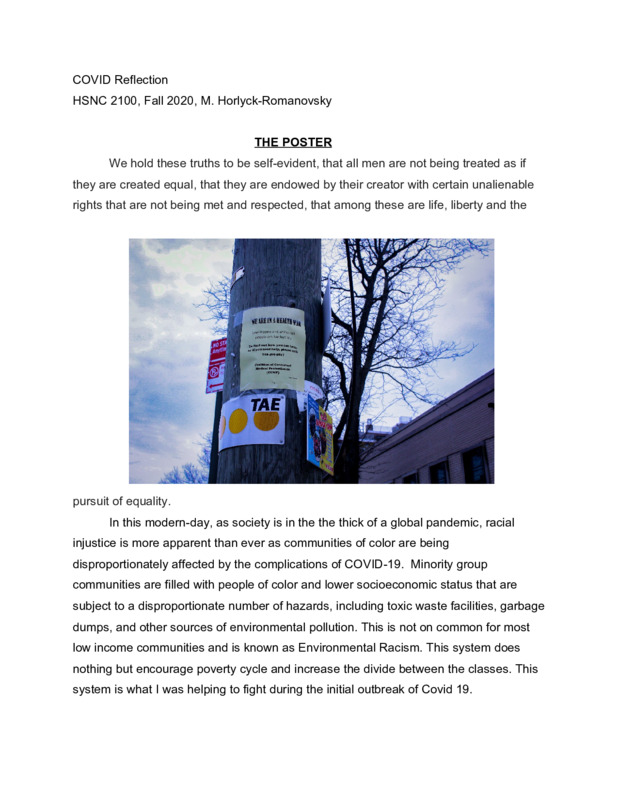 2020-03
2020-03The Poster
I am submitting my experience with learning about the truth behind environmental racism, how Covid 19 amplified these injustices, and how I got involved. -
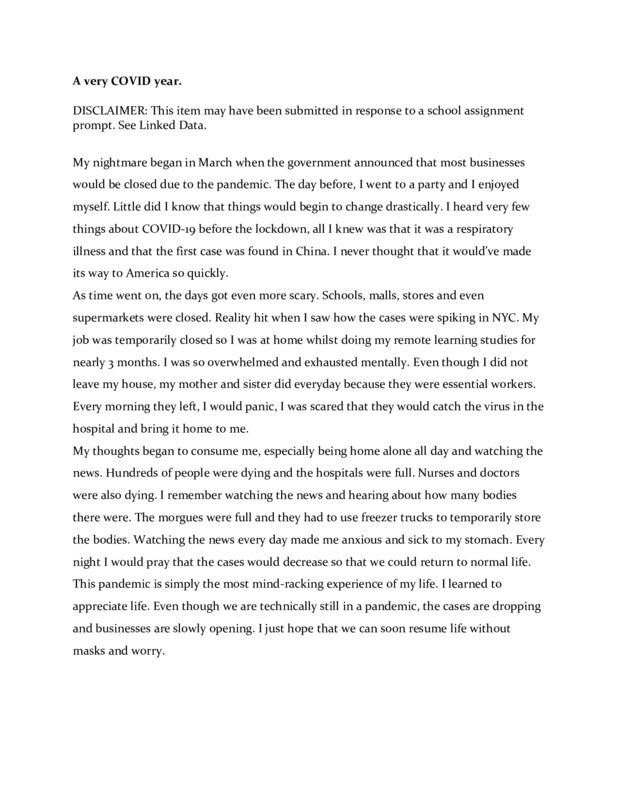 2020-03-15
2020-03-15A very COVID year.
My nightmare began in March when the government announced that most businesses would be closed due to the pandemic. The day before, I went to a party and I enjoyed myself. Little did I know that things would begin to change drastically. I heard very few things about COVID-19 before the lockdown, all I knew was that it was a respiratory illness and that the first case was found in China. I never thought that it would’ve made its way to America so quickly. As time went on, the days got even more scary. Schools, malls, stores and even supermarkets were closed. Reality hit when I saw how the cases were spiking in NYC. My job was temporarily closed so I was at home whilst doing my remote learning studies for nearly 3 months. I was so overwhelmed and exhausted mentally. Even though I did not leave my house, my mother and sister did everyday because they were essential workers. Every morning they left, I would panic, I was scared that they would catch the virus in the hospital and bring it home to me. My thoughts began to consume me, especially being home alone all day and watching the news. Hundreds of people were dying and the hospitals were full. Nurses and doctors were also dying. I remember watching the news and hearing about how many bodies there were. The morgues were full and they had to use freezer trucks to temporarily store the bodies. Watching the news every day made me anxious and sick to my stomach. Every night I would pray that the cases would decrease so that we could return to normal life. This pandemic is simply the most mind-racking experience of my life. I learned to appreciate life. Even though we are technically still in a pandemic, the cases are dropping and businesses are slowly opening. I just hope that we can soon resume life without masks and worry. -
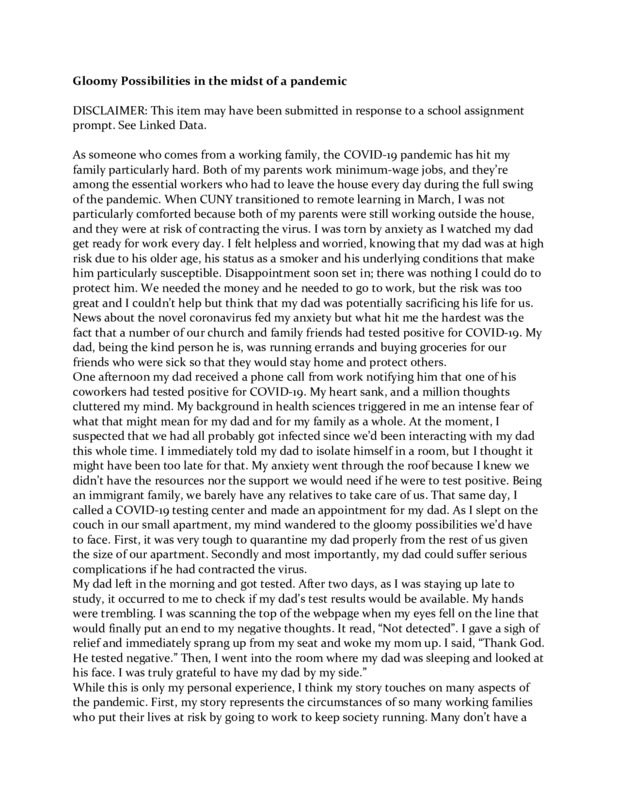 2020-05-20
2020-05-20Gloomy Possibilities in the midst of a pandemic
As someone who comes from a working family, the COVID-19 pandemic has hit my family particularly hard. Both of my parents work minimum-wage jobs, and they’re among the essential workers who had to leave the house every day during the full swing of the pandemic. When CUNY transitioned to remote learning in March, I was not particularly comforted because both of my parents were still working outside the house, and they were at risk of contracting the virus. I was torn by anxiety as I watched my dad get ready for work every day. I felt helpless and worried, knowing that my dad was at high risk due to his older age, his status as a smoker and his underlying conditions that make him particularly susceptible. Disappointment soon set in; there was nothing I could do to protect him. We needed the money and he needed to go to work, but the risk was too great and I couldn’t help but think that my dad was potentially sacrificing his life for us. News about the novel coronavirus fed my anxiety but what hit me the hardest was the fact that a number of our church and family friends had tested positive for COVID-19. My dad, being the kind person he is, was running errands and buying groceries for our friends who were sick so that they would stay home and protect others. One afternoon my dad received a phone call from work notifying him that one of his coworkers had tested positive for COVID-19. My heart sank, and a million thoughts cluttered my mind. My background in health sciences triggered in me an intense fear of what that might mean for my dad and for my family as a whole. At the moment, I suspected that we had all probably got infected since we’d been interacting with my dad this whole time. I immediately told my dad to isolate himself in a room, but I thought it might have been too late for that. My anxiety went through the roof because I knew we didn’t have the resources nor the support we would need if he were to test positive. Being an immigrant family, we barely have any relatives to take care of us. That same day, I called a COVID-19 testing center and made an appointment for my dad. As I slept on the couch in our small apartment, my mind wandered to the gloomy possibilities we’d have to face. First, it was very tough to quarantine my dad properly from the rest of us given the size of our apartment. Secondly and most importantly, my dad could suffer serious complications if he had contracted the virus. My dad left in the morning and got tested. After two days, as I was staying up late to study, it occurred to me to check if my dad’s test results would be available. My hands were trembling. I was scanning the top of the webpage when my eyes fell on the line that would finally put an end to my negative thoughts. It read, “Not detected”. I gave a sigh of relief and immediately sprang up from my seat and woke my mom up. I said, “Thank God. He tested negative.” Then, I went into the room where my dad was sleeping and looked at his face. I was truly grateful to have my dad by my side.” While this is only my personal experience, I think my story touches on many aspects of the pandemic. First, my story represents the circumstances of so many working families who put their lives at risk by going to work to keep society running. Many don’t have a choice but to continue working amidst the dangerous conditions. Here’s the reality, the pandemic has disproportionately affected those with low socioeconomic status either because they’re unable to stay safely at home or because they lack access to healthcare and other resources, which contribute to poorer health status overall. As someone studying health sciences, I’m interested in looking at the association between socioeconomic determinants and health outcomes. The pandemic has shed light on certain inadequacies that we could hopefully remediate in the future. This experience has taught me to appreciate my loved ones more than ever, and it has shown me that we should stand with each other in times of adversity like my dad did with his neighbors. While I was lucky that my family and I were healthy, the panic of a potential loss gave me a taste of what my community has been going through. My heart aches for the families that lost loved ones to the pandemic and particularly for those who had scarce resources to protect and support themselves. -
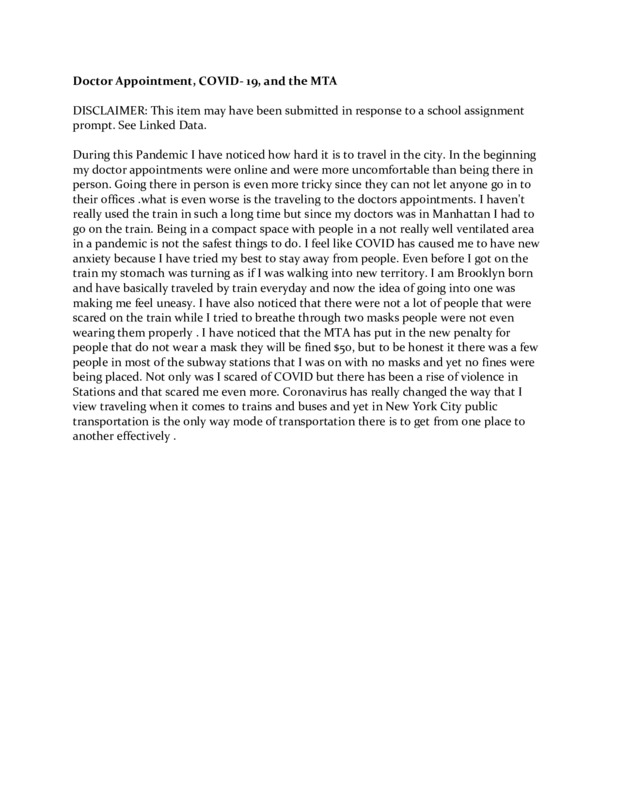 2020-09-24
2020-09-24Doctor Appointment, COVID- 19, and the MTA
During this Pandemic I have noticed how hard it is to travel in the city. In the beginning my doctor appointments were online and were more uncomfortable than being there in person. Going there in person is even more tricky since they can not let anyone go in to their offices .what is even worse is the traveling to the doctors appointments. I haven't really used the train in such a long time but since my doctors was in Manhattan I had to go on the train. Being in a compact space with people in a not really well ventilated area in a pandemic is not the safest things to do. I feel like COVID has caused me to have new anxiety because I have tried my best to stay away from people. Even before I got on the train my stomach was turning as if I was walking into new territory. I am Brooklyn born and have basically traveled by train everyday and now the idea of going into one was making me feel uneasy. I have also noticed that there were not a lot of people that were scared on the train while I tried to breathe through two masks people were not even wearing them properly . I have noticed that the MTA has put in the new penalty for people that do not wear a mask they will be fined $50, but to be honest it there was a few people in most of the subway stations that I was on with no masks and yet no fines were being placed. Not only was I scared of COVID but there has been a rise of violence in Stations and that scared me even more. Coronavirus has really changed the way that I view traveling when it comes to trains and buses and yet in New York City public transportation is the only way mode of transportation there is to get from one place to another effectively . -
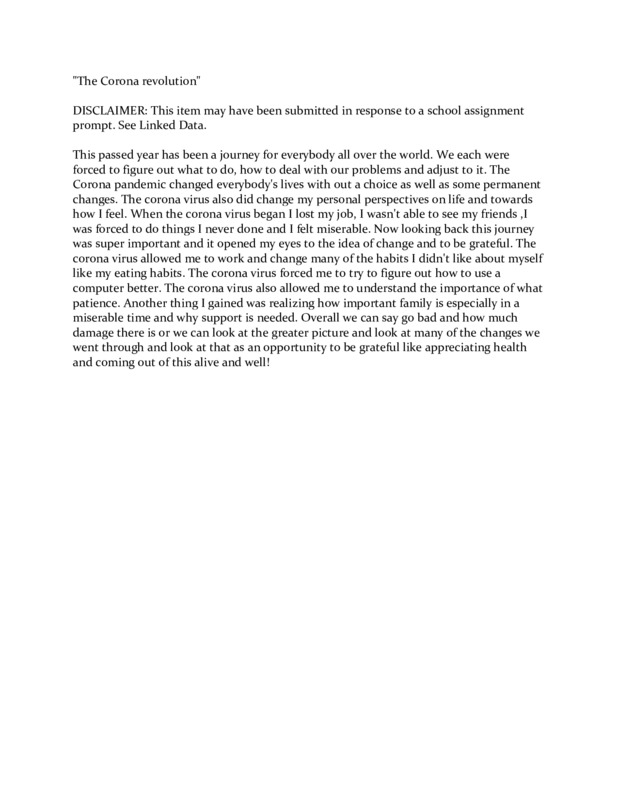 2020-03-13
2020-03-13"The Corona revolution"
This passed year has been a journey for everybody all over the world. We each were forced to figure out what to do, how to deal with our problems and adjust to it. The Corona pandemic changed everybody's lives with out a choice as well as some permanent changes. The corona virus also did change my personal perspectives on life and towards how I feel. When the corona virus began I lost my job, I wasn't able to see my friends ,I was forced to do things I never done and I felt miserable. Now looking back this journey was super important and it opened my eyes to the idea of change and to be grateful. The corona virus allowed me to work and change many of the habits I didn't like about myself like my eating habits. The corona virus forced me to try to figure out how to use a computer better. The corona virus also allowed me to understand the importance of what patience. Another thing I gained was realizing how important family is especially in a miserable time and why support is needed. Overall we can say go bad and how much damage there is or we can look at the greater picture and look at many of the changes we went through and look at that as an opportunity to be grateful like appreciating health and coming out of this alive and well! -
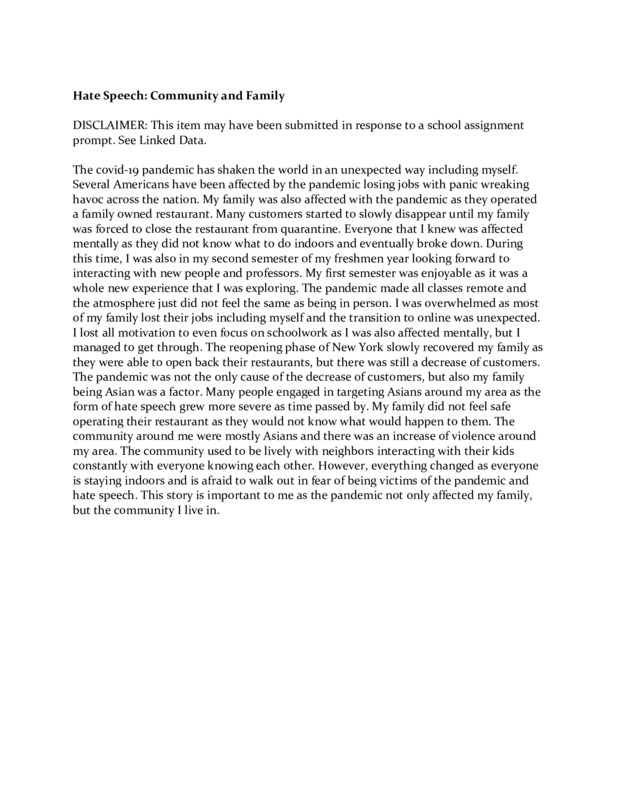 2020-03-31
2020-03-31Hate Speech: Community and Family
The covid-19 pandemic has shaken the world in an unexpected way including myself. Several Americans have been affected by the pandemic losing jobs with panic wreaking havoc across the nation. My family was also affected with the pandemic as they operated a family owned restaurant. Many customers started to slowly disappear until my family was forced to close the restaurant from quarantine. Everyone that I knew was affected mentally as they did not know what to do indoors and eventually broke down. During this time, I was also in my second semester of my freshmen year looking forward to interacting with new people and professors. My first semester was enjoyable as it was a whole new experience that I was exploring. The pandemic made all classes remote and the atmosphere just did not feel the same as being in person. I was overwhelmed as most of my family lost their jobs including myself and the transition to online was unexpected. I lost all motivation to even focus on schoolwork as I was also affected mentally, but I managed to get through. The reopening phase of New York slowly recovered my family as they were able to open back their restaurants, but there was still a decrease of customers. The pandemic was not the only cause of the decrease of customers, but also my family being Asian was a factor. Many people engaged in targeting Asians around my area as the form of hate speech grew more severe as time passed by. My family did not feel safe operating their restaurant as they would not know what would happen to them. The community around me were mostly Asians and there was an increase of violence around my area. The community used to be lively with neighbors interacting with their kids constantly with everyone knowing each other. However, everything changed as everyone is staying indoors and is afraid to walk out in fear of being victims of the pandemic and hate speech. This story is important to me as the pandemic not only affected my family, but the community I live in. family, hate speech, restaurant, job, college, community, Asian -
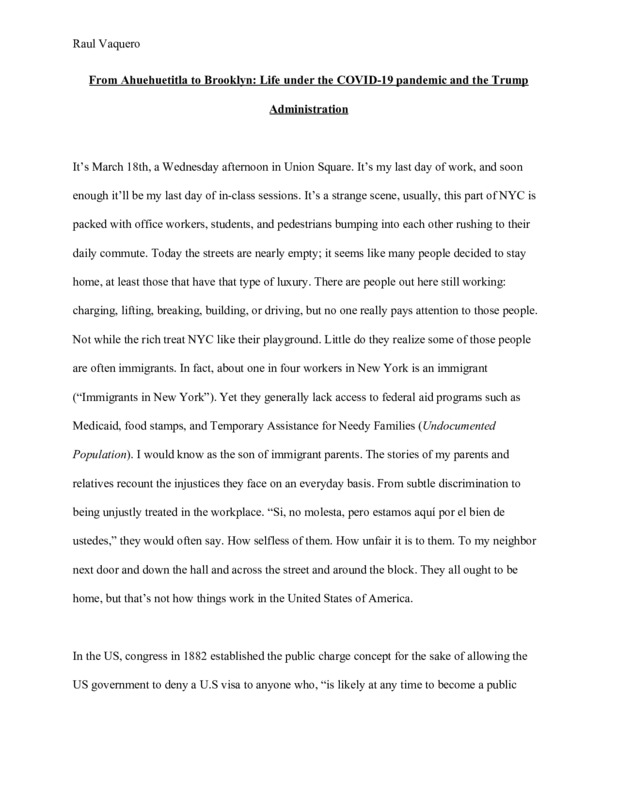 2020-08-31
2020-08-31From Ahuehuetitla to Brooklyn: Life under the COVID-19 pandemic and the Trump Administration
Using autoethnography as the method of research, this paper explores the fears and anxieties exacerbated in the Latinx community during the COVID-19 pandemic. Through narrative snapshots, I depict how the pandemic worsened due to policy meant to limit undocumented Latinx immigrants’ access to health services. By focusing on the evolution of the public charge, this project depicts the ways the Trump administration’s hateful rhetoric and racist policies exacerbate the fear, life-threatening conditions, and long-lasting trauma on undocumented Latinx immigrants during the COVID-19 pandemic. Closing in on one Brooklyn family’s navigation of the 2020 political climate, worsening pandemic, working-class realities, and immigration system, I take you through the present realities often left unseen by mainstream media. -
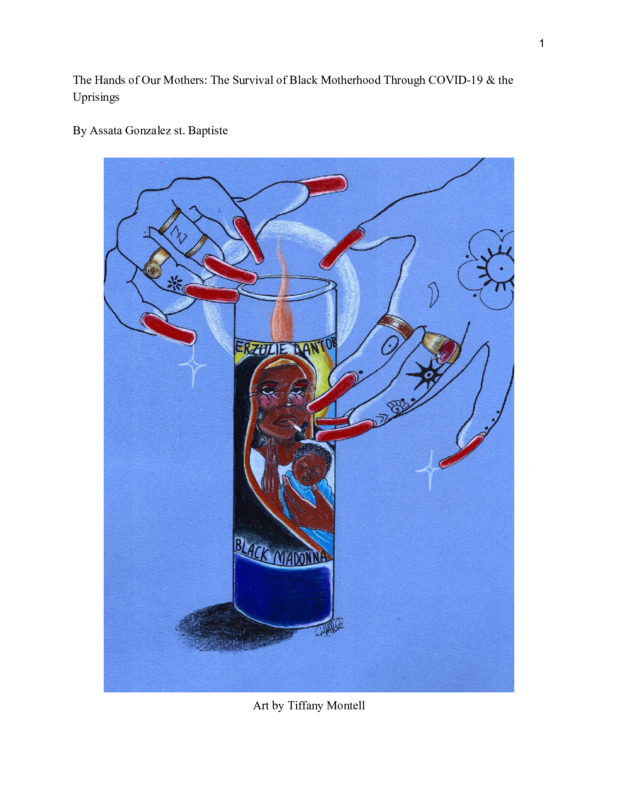 2020-09-17
2020-09-17The Hands of Our Mothers: The Survival of Black Motherhood Through COVID-19 & the Uprisings
My project sought to examine and understand the historical resilience of Black motherhood and its relation to the life altering pandemic, COVID-19 and racially driven uprisings against systematic oppression; How Black motherhood and resistance through Black motherhood adapted, how it’s changed and what new radical resistance through motherhood was conjured in face of the pandemic and race clarity. As an autoethnographic account this research project was centered around my experience of motherhood and communal connections, as well as the experiences of Black mothers and birth workers. The political positioning of Black mothers was considered through essays and poetry written, as well as photos during the lockdowns in relation to the concepts of birth and death, the idea of radical mothering and activism, and the umbrella term of community. -
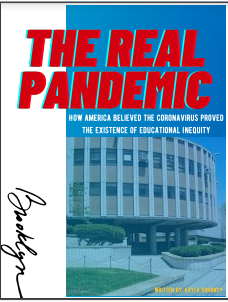 2020-08
2020-08The Real Pandemic: How America Believed The Coronavirus Proved the Existence of Educational Inequity
Several articles seek to expand the conversation of educational inequity during the pandemic in New York City public schools, however many exclude key aspects of inequality that predate the pandemic. This narrative acknowledges and challenges notions that use the pandemic to explain the inequality. It is not only my personal experience throughout the pandemic, but also the experiences around public education of me, my students, and co-workers. Amplifying the necessity for leadership, mental health, and technology to combat the concerns of racial and class retraumatization, the aspiration and achievement gap, and other aspects of inequity. In this analysis, we transform ideas about inequality in relation to [rather than caused by] the pandemic and challenge readers to think about solutions in a different way.
